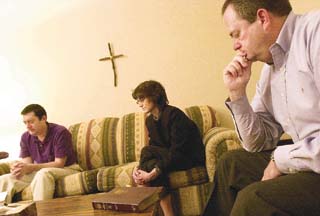| |
The following is from a Colorado Springs Gazette newspaper article
May 1, 2000 newspaper article
May 1, 2000
God is my CEO
by Ovetta Sampson (719-636-0374 or ovetta@gazette_NOSPAM_.com)
Jay Janner/The Gazette

From left, Noochee Solutions employees Tait Cyrus,
Karen Knight and David Ball pray during a recent
morning prayer meeting.
Noochee Solutions isn't like other high-tech firms in Colorado Springs. It's not the "softball casual" dress of employees or the children and pets that sometimes roam the hallways. The difference is more subtle.
New employees at the Colorado Springs-based software firm don't notice the difference immediately. As you pass the foyer, hang a left down a poorly lit hallway to a small bland room and the difference is apparent - in the company's prayer room. A small wooden cross provides the room's only decoration.
Noochee Solutions is a Christ-centered company, and its president and chief executive officer, Frank Ricotta, doesn't try to hide it.
"My employees know we build our company values around Christ-centered values," said Ricotta, who is Roman Catholic. "It's such a core tenet of our life here."
At his company the golden rule - do unto others as you would have them do unto you - is the most important rule. Ricotta said the values of respect, honesty, integrity, ethics and neighborly love that Jesus lived is what he expects of his employees.
Twenty years ago, mixing spirituality and business was taboo. They seemed to be incompatible. Most managers believed businesses couldn't survive without engaging in cutthroat competition and treating employees ruthlessly.
Those attitudes have changed amid a nationwide resurgence in spirituality, prompting employees to search for meaning at home and at work. Religion has become an integral part of the workplace for companies like Noochee that provide prayer rooms and others that offer on-site chaplains for employees.
The growing role of religion in the workplace means both sacrifice and great benefits.
"(Before,) work had become merely about survival so that the only thing that I do in work is to earn my daily bread," says Martin Rutte, a management consultant from Santa Fe, N.M., and co-author of the best-seller "Chicken Soup for the Soul at Work," ($12.95, Health Communications).
"That's no longer sufficient. The Generation Xers are saying that's no longer sufficient, the Baby Boomers are saying it's no longer sufficient. (Companies) now have to wrestle with (spirituality in the workplace)."
The gap closes
Spirituality thrived in the workplace in the 1800s, but increased emphasis on keeping church and government matters separate spread among businesses. Fear of discrimination lawsuits prompted many companies to discourage spirituality, forcing employees to hide their beliefs.
"The perception was if we allow spirituality into our workplace we can open ourselves to all kinds of turmoil," said Rutte. "It's perceived as a source of conflict."
But a wave of corporate downsizing in the 1990s weakened the trust employees placed in their companies and jobs, said Carolyn Shadle, an associate dean in the Daniels College of Business at the University of Denver.
"Any business knows that if you can enable people to align their own personal life goals and mission and purpose, that congruency makes for a happier worker," Shadle said.
For example, Xerox Corp. takes employees to the New York's Catskill Mountains for "vision quests." Pizza Hut is hiring chaplains available to employees on an on-call basis, and the Fellowship of Companies for Christ offers chief executives blueprints on how to build a business plan based on Christian principles.
"This is an emerging phenomenon," Rutte said. "People in the workplace don't want to leave their soul at the doorstep when they come to work every morning."
Sacrificing for faith
Using faith as a guiding principle in business can be difficult when most other businesses don't follow those same rules.
Sam Khanafar owns an International House of Pancakes near Chapel Hills Mall. In a gesture of good will, vendors sometimes offer him a special deal or discount on products, he said. Vendors don't want him talking about those deals to other companies. He instead refuses those offers.
"From my Muslim point of view I cannot hide anything," Khanafar said. "Islam teaches us to obey the laws. There is no behind-the-scenes kind of dealing. That would be like stealing money."
Khanafar said Islamic law also requires he give customers what they pay for. That means he serves customers an 8-ounce steak specified in an advertisement rather than a 6-ounce serving other restaurants may give. He asks his employees to weigh servings precisely.
Khanafar's restaurant also is spotlessly clean because he follows Islamic law on cleanliness.
Following Islamic law takes additional effort and is sometimes more expensive, Khanafar said, but the rules make his business better for society.
"Whatever you do affects also society," he said. "As an individual if I overlook, then other people overlook, then we're not going to have a healthy society."
Noochee's Ricotta backs his beliefs with his actions. Believing people should be treated as
he would want to be treated, he sacrifices his own earnings to boost employee salaries. Noochee's 186 employees own 40 percent of the company.
Ricotta refuses to let business trump his faith. He once gave up an account worth $150,000 a month because he believed the company didn't deal honestly with him.
"We just turned and walked away," he said. "If you're around that stuff too much, it starts rubbing off."
Joseph Rallo, dean of the College of Business at the University of Colorado at Colorado Springs, said a company can risk its survival by marketing its commitment to spirituality or any other special interest.
"If you start a company today, you probably have a 1 in 10 chance of making it happen," he said. "If these beliefs are so important to you that you want to add less chances, then it's your choice. It's just another business decision."
Besides, losing business by infusing spirituality into the workplace could trigger lawsuits. According to the U.S. Equal Employment Opportunity Commission, religion discrimination claims jumped 30 percent from 1992 to 1999. Companies paid more than $3 million in damages to plaintiffs.
Noochee managers say they don't force religion on employees. Religion isn't even mentioned in the interview process.
"It's not about somebody believing what I believe," said Ricotta, who employs Muslims, Hindus, evangelical Christians and those of other faiths at his company. "It's creating an environment based on the integrity and principles defined in the Bible, which are universal."
Workers seek faith
Some employees working in faith-based organizations said the religious outlook of managers is a benefit rather than a drawback.
Tait Cyrus didn't know about Noochee's religious philosophy when he interviewed with the company nearly two years ago. After a couple of weeks, he noticed the prayer room. He later found that employees talked openly about religion. Cyrus, once an atheist and now a devout Christian, found that attitude refreshing.
"To me, that was confirmation that this is where I'm supposed to be," said Cyrus. "In general, people's lives are usually broken up between their home life and their work. (That means) I can't talk about my life and I can't talk about who I am. It's good not to feel that repression."
Paul Anderson spent years with accounting giant Price Waterhouse but still felt a void.
"That was much more about how much profit can you make at the firm," Anderson said. "The bottom line is all about money and it's about resources and it's about how much can you make to put in your pocket."
Anderson is now an accountant at Capin and Crouse LLP, a Colorado Springs accounting firm for Christian and nonprofit organizations. He works with missionaries, churches and other religious groups. His income has dropped, but he's much happier.
"The difference is in the satisfaction I get from my work," Anderson said. "It's knowing that the product of what I do goes to contribute to the greater good of the world around us."
Rules of the road
Excerpts from Noochee Solutions' staff rules:
- God is our trailmaster.
- Do fabulous work and be known around the world for our innovativeness and our ability to deliver solutions.
- Attract exciting people - more than a few of whom are a little offbeat.
- Make a difference, have fun and constantly question "the way things are done around here," and never, ever rest on our laurels. (Today's laurels are tomorrow's compost).
- Treat others as you would like to be treated (i.e., with dignity and respect).
- Have a collegial, supportive, yeasty, zany, laughter-filled environment where folks support one another and politics is as absent as it can be in a human (i.e., imperfect) enterprise.
- Ensure that no question or innuendo ever surfaces about our ethics.
- To be a leader in this organization you must be a servant leader.
Source: Noochee Solutions.
Federal rules on religion in the workplace
Infusing religion in the workplace can be tricky. That's because Title VII of the Civil Rights Act of 1964 prohibits employment discrimination based on race, color, religion, sex or national origin. Here's how some companies have a God-based business but avoid federal trouble:
- Della Ardoin, Noochee Solutions' human resource manager, said recruiters cannot mention religion in an interview, even if the prospective employee brings it up.
"We give them a feel for the culture," she said. "We say this company is based on moral values, (but) we don't mention 'Christian' or anything like that."
- Companies can't force employees to attend religious meetings.
- And don't even think about promoting people based on their religious practices.
- The Civil Rights Act requires companies and labor organizations to reasonably accommodate the religious practices of an employee or prospective employee unless the employer demonstrates such an action would cause undue hardship.
- For workers, attorneys say they can keep a Bible or religious book on their desks to read during breaks. It's fine to discuss religious views, subject to the same rules applied to other employee expression.
- For information on employee rights and religion, check out www.eeoc.gov
|




